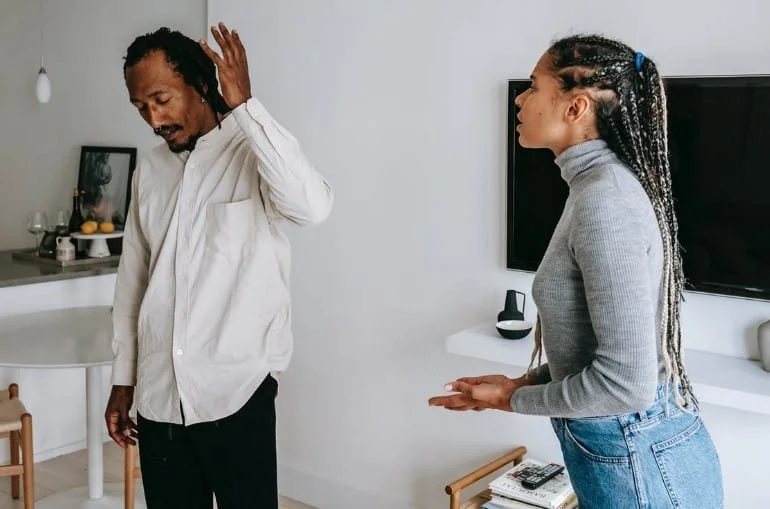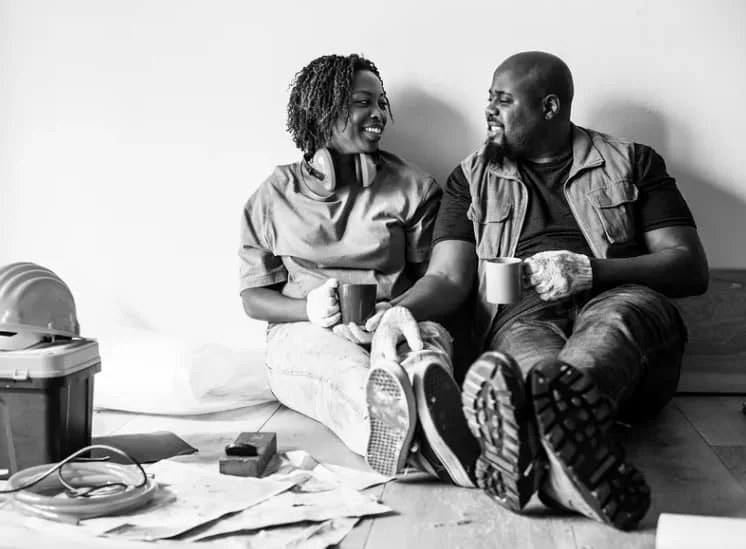“My husband doesn’t understand my anxiety.” That’s a fairly common complaint among many married women with anxiety issues.
Here are some off-hand comments married women with anxiety might be familiar with:
- “Stop using your bipolar as an excuse for unacceptable behavior!”
- “I’m not wasting my time seeing a shrink with you.”
- “Calm down! You always blow things out of proportion.”
A mental illness is often difficult to share; the mere thought of talking about the problem may increase anxious feelings. Yet, many women express disappointment about inadequate support from their husbands or romantic partners, even though they ― the women ― have a hard time discussing the issue.
If you’re one of these women, this article is for you!
Keep reading because this article discusses the best tips on sharing your problem with your spouse and hopefully get them to understand your anxiety.
Here’s something to keep in mind right off the bat:
Don’t expect your husband to understand your anxiety and become completely supportive overnight! Expecting an immediate change in attitude from your spouse may be asking for too much and setting yourself up for disappointment.
Changes take time, so give your husband ample time to adjust their behavior to a more supportive one. Consider encouraging your spouse to read this article. It will help him be more open to supporting you better.
Preparing to Explain Your Anxiety

Getting your husband to understand your anxiety isn’t going to be a walk in the park, especially if your man has little or no knowledge about mental health issues.
Remember, it is difficult for some people to understand an “invisible illness,” let alone show compassion toward your anxiety.
Trying to force your man to see things from your point of view usually doesn’t work. If anything, you may make them mad, which may lead to shouting you down, ignoring you, or generally making things worse.
Many married women with anxiety issues have husbands who think they are just being overly dramatic. There are several hurtful statements you’ll expose yourself to if you try to bang things into place too soon.
Some husbands may consider it wasteful to pay money to speak with a therapist when there are bills to pay! If you have a particularly critical spouse, you’ll need to be a bit more patient with them, as your goal is not to make matters worse but to get them to understand your anxiety and be more supportive.
Next, you must learn to love and accept yourself just as you are. Struggling with anxiety doesn’t make you unworthy ― you are still the amazing, unique human you are! I encourage you to read this post and rediscover how to fall head-over-heels with yourself again.
Once the groundwork is covered, you’re ready to explain your anxiety in ways your spouse will likely understand.
8 Things to Do to Make Your Husband Understand Your Anxiety
If you find yourself thinking, “My husband doesn’t understand my anxiety,” the following tips can help you change that narrative.
1. Write a Letter to Your Husband

If you’re like most people, sharing your thoughts and feelings on paper is a lot easier. You don’t have to deal with the other person face-to-face, so it removes some of the apprehension you might have about clearly expressing your inner thoughts.
Talking in person often means dealing with interruptions from the other person. On the other hand, you can write your thoughts down without your spouse interrupting you. This gives you full control of how the “conversation” should go.
Start by jotting down the issues you’ll like to address, such as the symptoms you face, likely triggers, and how you feel in anxious situations.
Remember to keep the tone of your letter positive. Here’s what that means.
Avoid blaming anyone ― least of all, your husband ― for how you feel. Even if you’ve always thought, “my husband doesn’t understand my anxiety,” avoid letting that thought seep through into your notes to him.
Of course, you should be honest and open, but you want to avoid anything that appears like finger-pointing or statements that will make your husband feel they are not supportive. Instead, express hope that they’ll be more supportive now that they have a better insight into your plight.
2. Share Your Journal
If writing a letter to your husband seems a bit too direct, you can share your journal with him. Don’t have a journal? You should seriously consider getting one and start journaling as soon as possible.
You don’t have to be a professional writer to start putting your thoughts down in a journal. Simply write down what your daily life looks like as someone struggling with anxiety.
Here’s how to make your journal express exactly what you feel: don’t write as if you’re going to share it.
In other words, don’t worry about editing or making your journal sound politically correct! Think of it like a brain dump of some sort ― where you allow your thoughts to flow freely onto paper.
Include your fears, worries, concerns, and exactly how you feel about the different issues in your marriage, career, and other aspects of your life.
Although the idea is to share your journal with your spouse, journaling is therapeutic. It can help you cope with excessively worrying, especially if you do it regularly.
Of course, your anxiety is less likely to magically vanish just because you penned down your thoughts for a few days. However, writing can bring about some sort of relief from anxious thoughts, even if it is temporary.
3. Communicate How You Like to Be Supported

“I’ve already told him what to do; still, my husband doesn’t understand my anxiety!” That’s a valid point, but perhaps you should consider changing your approach.
It might be more effective to suggest ways your husband can support you stop instead of telling him what to do.
Men naturally have bigger egos than women, so it is normal for your husband not to like being told what to do.
Consider making a list of ways you’ll prefer to be supported in managing your anxiety and discuss the list with him. This way, you’re giving him the chance to make an input rather than giving him instructions.
Remember, communication is a vital ingredient in any relationship. And if you hope to work things out with your spouse, you must do so as a team. As you already know, teams don’t succeed without effective communication, so be diplomatic when you suggest things your husband can do to help you cope with your anxiety.
4. Be Clear About What’s Unhelpful
While we’re still on the subject of communication, letting your husband know what doesn’t help your anxiety is equally vital for a healthy relationship.
Here’s the thing.
There are several anxiety disorders, and everyone responds differently to the symptoms they experience.
That’s another way of saying there is no one-size-fits-all when it comes to helping someone with anxiety.
When a woman says, “My husband doesn’t understand my anxiety,” it doesn’t necessarily mean her spouse is uncaring or not empathic. Sometimes, she is just overwhelmed by her husband’s unhelpful, though well-intentioned, approach to helping her cope with anxiety.
Your anxiety might worsen if your hubby is all over you in a bid to help when you’d prefer to be by yourself. For this reason, it is best to lovingly tell your loved one the dos and don’ts when it comes to helping you manage your anxiety and excessive worry.
5. Let Your Husband Know Your Triggers

Your husband might unintentionally do things that will elicit negative reactions from you. These are anxiety triggers you and your spouse must avoid.
This is why it is crucial to discuss your triggers with your husband to help him understand why such situations can bring back traumatic memories. Let him know specific events or situations that can make you react negatively, even if you mean no harm.
In addition to events and situations, certain words or phrases can trigger anxiety and negative thoughts.
Anxiety-triggering phrases vary from person to person, depending on their personal experience and the context of their relationship.
Make sure to let your hubby know the phrases that trigger your anxiety so he can avoid them.
Trigger phrases might include:
- Calm down!
- We need to talk
- Stop overthinking the situation
- Just relax
- You’re just worried over nothing
- You’re acting so weird
- Let’s talk about it later
- Don’t worry. I’ll just handle it myself
6. Talk About Your Anxiety When You Are Calm

Typically, you are mostly tuned into your emotions when you are anxious. This makes it difficult to think rationally, as your thoughts are largely focused on the negatives, and you tend to easily believe that everything is working against you.
In this emotional state, you seek reassurance and want someone that will simply listen to you. However, most partners who don’t quite understand anxiety will do their best to give you advice or talk you out of your emotional mind.
This method usually doesn’t work. Instead, it produces the opposite effect ― leaves you feeling more emotional.
One good approach to helping you cope with anxiety is to talk about it with your loved one or family member when you are relatively calm and not feeling threatened. This way, your spouse will understand how best to help you when responding to situations from the emotional mind.
7. See a Counselor Together

Therapy and counseling for anxiety can help you figure out why your husband doesn’t seem to understand your anxiety. Counseling also helps increase coping strategies, relieve symptoms, and eventually provide a lasting solution for your anxiety disorder.
It is not uncommon for husbands to feel that wives with anxieties consider them therapists. They will likely push away if they feel this way, making the wives feel less supported and resentful.
To avoid this situation, consider seeing a therapist together if your husband is willing. Discuss the issue during a session with your counselor (you should be working with one) and then suggest it to your husband. Hopefully, he will agree to work with a counselor (even if it is not your current therapist).
8. Treat Your Husband the Way You Want Him to Treat You
Sometimes, try to see things from your spouse’s perspective when he can’t meet your needs instead of playing the blame game.
If you’re always thinking, “My husband doesn’t understand my anxiety,” perhaps you should consider adhering to the scriptural advice: “Do unto others as you would have them do unto you.”
Indeed, your husband might not give you the support you need but labeling him as selfish and uncaring does very little to solve the problem. If anything, it creates resentment, making you pull away from him.
There is no doubt that you need your spouse to be more supportive because of your anxiety disorder. However, he may also have some unmet needs that make him moody or sometimes put him in difficult situations.
Your hubby might feel:
- Disappointed in himself for not being the type of partner you need
- Less confident in his ability to cater to your needs as a man
- Exhausted from trying and failing to relieve your anxiety
- Frustrated because the anxiety steals joyous moments you could have shared
A more helpful approach would be to shift from blame to validating each other’s feelings and experiences. This way, you’re more likely to align with each other and reduce conflict.
Final Thoughts
Anxiety can be a very challenging “invisible” illness to deal with, especially if you’re in a committed relationship like marriage. It can put a serious strain on your relationship if not properly addressed.
While your spouse should help your sort things out, you shouldn’t make them solely responsible for relieving your anxiety. Doing so might lead to being overly dependent on your husband and cause resentment when he doesn’t respond as you want.
Here’s one final thing.
Remember that improving self-esteem in your relationship is essential to keeping the spark alive in your marriage. If you think your anxiety is affecting your confidence and making you overly dependent on your spouse, I invite you to check out my previous post for practical steps to start taking right now.




